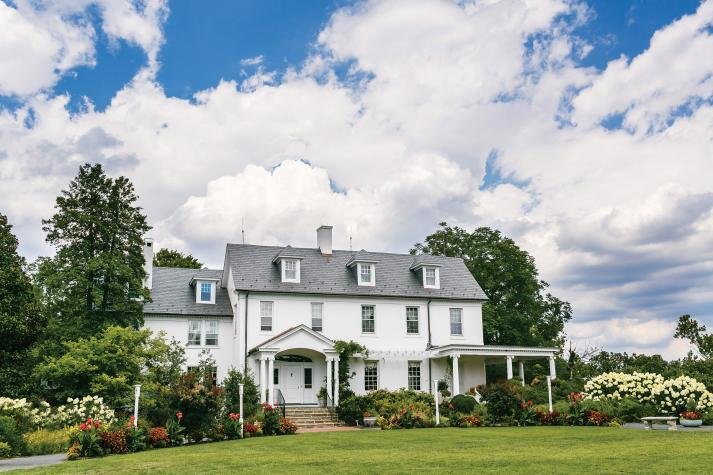The Fairfax County Planning Commission last week unanimously approved a proposal to establish the Wellington in the River Farm Historic Overlay District (WHOD). The Board of Trustees will consider the proposal at a public hearing on April 13th.
The process was first initiated at a November 2020 board meeting that approved the review of a historic overlay district on the River Farm. This was in response to actions by the owner, the American Horticultural Society (AHS), which announced in September that it would put the property up for sale, citing financial difficulties. AHS listed the property in November for $ 32.9 million.
According to a staff presentation on the proposed WHOD, it would serve as a zoning tool that would “promote general well-being … by identifying, maintaining and improving those buildings, structures, neighborhoods, landscapes, places and areas of historical background, cultural, architectural and archaeological importance. ”
Residents of the area are concerned that the historic structure and property will be added to with new homes, although AHS has stated that they would prefer the owner to keep most of the property as it is now. The new district would not completely prevent redevelopment, but it would limit it considerably.
River Farm remains in the market, trading at $ 32.9 million. AHS turned down an offer to buy from NOVA Parks and the Northern Virginia Conservation Trust in February.
The planning commission’s staff report cited the site’s rich history, including eight existing structures and the property’s view of the Potomac as reasons behind the creation of the WHOD. Archaeological work on the site indicates that the area was occupied by Native Americans for centuries before the property was acquired by Giles Brent in the 1650s. Perhaps most significant is the purchase of the land by George Washington in 1760; it stayed in his family until 1859.
The 27.58-acre lot at 7931 East Boulevard Drive in the Alexandria neighborhood of Fairfax County has served as AHS headquarters since the 1970s. Local philanthropist Enid A. Haupt donated $ 1 million to AHS to help them purchase the property. She was motivated after the property was almost sold to the Russians for use as a retreat. In a March 11, 1973 article in the New York Times, Haupt was quoted as saying, “We could never allow the Russians to do so. We had to preserve this property for the citizens of the United States. This is part of George Washington’s estate; Part of my country’s legacy. “Haupt said she wanted the property to be open to the public.
It is a desire to open the River Farm to the public and preserve its unique cultural, historical and natural significance that has inspired many local elected officials, community members, civic and historical associations, conservation organizations and others to start a movement to ” Saving the River “Start Farming.” This includes a petition with over 4,000 signatures and the proposal to create the WHOD.
Seventeen of these elected officials, parishioners and other interested parties spoke out in favor of the creation of WHOD at the planning committee meeting. Many of them referred to their personal connections to the website and emphasized the importance of the website as a place for education, weddings and simply as a place to enjoy the outdoors. They expressed disappointment with AHS ‘decision to sell the property and questioned the organization’s motives and commitments despite AHS having pledged in the past to maintain public access to River Farm.
One of the public triggers for WHOD was Keister Evans, who served as Executive Director of AHS from 1970 to 1976 and was instrumental in the acquisition of River Farm. He confirmed Haubts desire to keep the site for public use. “She was extremely interested in the Wellington property, particularly in its historical significance as part of the George Washington River Farm and in keeping it open to the public as a horticultural and gardening venue,” he said.
Delegate Paul Krizek and Senator Scott Surovell also spoke during the meeting to offer their support for HOD. They revealed that River Farm’s maintenance is supported by numerous elected officials from Mount Vernon Supervisor Dan Storck, Senators Mark Warner and Tim Kaine, and Governor Ralph Northam. Virginia Senate Bill 1457, expected to be soon signed by Northam, would require a subdivision of the HOD to be overseen by the Architectural Review Board, and would also allow Fairfax County to pass an ordinance that would allow public use as part of it requires a HOD at the River Farm.
The establishment of WHOD and the passage of SB1457 will not prevent the sale of River Farm to a developer or the subdivision and future development of the property which is not part of any relief. However, this would limit the nature of development and prevent the destruction of historic buildings on the property. Draft design guidelines for the proposed HOD state that any development will be required to “preserve, strengthen and enhance the historic and architectural character of the district”.
Permissible uses of the property would be single-family houses and public use. The proposal would also allow special exemptions for the possible reuse of existing structures as antique shops, art and craft galleries or bed and breakfasts. No structures could exceed 35 feet in height.
AHS has made several statements that they want River Farm to remain open to the public in some way, despite an offer from NOVA Parks and the Northern Virginia Conservation Trust earlier this month being turned down.
AHS decided not to reopen the site to the public in the spring after it closed in November in response to COVID-19.
The planning commission voted unanimously and with little discussion in favor of recommending the adoption of the WHOD to the board of directors.
